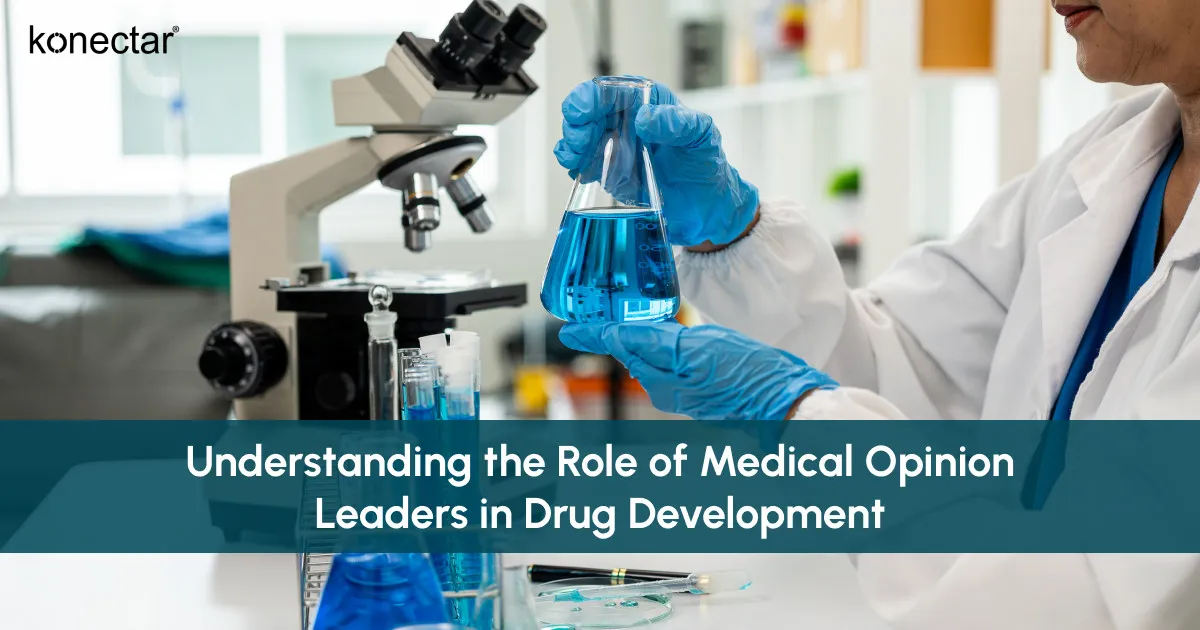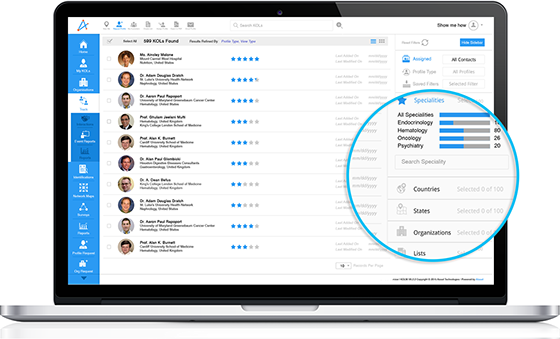27-12-2024
Understanding the Role of Key Opinion Leaders in Drug Development

The pharmaceutical industry faces significant challenges in developing new drugs that are effective and safe. In addition, navigating the stringent regulatory environment is no easy task. These two factors necessitate collaboration with key opinion leaders (KOLs).
In this article:
KOLs in pharma are respected medical experts who leverage their deep understanding of medical knowledge, practical experience of patient care, and treatment protocols to guide the drug development process from conception to adoption.
Incorporating the expertise of key healthcare opinion leaders allows pharma companies to enhance the relevance and success rate of their products, ensuring that they fulfill the real-world needs of patients while adhering to the latest clinical practice.
KOLs and Their Importance in the Pharma Industry
Key opinion leaders in healthcare are seasoned professionals and researchers who hold significant sway over the medical community due to their knowledge and influential positions.
Thought Leadership and Trust
KOLs are individuals who are at the forefront of medical research and practice. They bring credibility and trust to the pharmaceutical companies they collaborate with.
For example, key opinion leaders in medical devices collaborate closely with manufacturers to enhance device innovation and ensure that new technologies meet clinical needs and regulatory standards.
Their collaboration is crucial since new drugs must be backed by solid medical evidence and expert approval to gain acceptance from HCPs and patients.
Advocacy and Education
KOLs play vital roles in educating their peers, the medical community, and the public about new drugs & therapies. Their endorsements help to build awareness and acceptance of new treatments.
Regulatory Influence
KOLs participate in regulatory panels and advisory committees, where their opinions help shape the legal and ethical standards of medical products and practices.
Their influence is crucial in approving new drugs, as they can advocate for the clinical benefits of newer therapies.
Opinion leaders in healthcare, especially those involved in regulatory panels and advisory committees, exert significant influence on the development of legal and ethical standards for medical practices and products.
Role of KOLs in the Drug Development Process
The influence of KOLs extends beyond clinical research and clinical trials to market adoption and post-market launch surveillance.
1. Market Introduction
Once a drug is approved, KOLs assist in its market adoption by raising awareness about its benefits, proper use, and potential risks.
Their expertise is crucial in building confidence among prescribers and patients alike. KOLs are instrumental in educating and training, advocating for the product, and collecting feedback.
2. Ongoing Research and Development
Even after a drug's release, KOLs remain involved in assessing its real-world effectiveness and safety. Their ongoing contributions help to refine treatment protocols and identify new therapeutic needs.
As key opinion leaders in clinical research, their insights continue to drive innovations and improvements in how drugs are used in healthcare settings.
Influence of KOLs on Drug Development
Key Opinion Leaders (KOLs) play a crucial role in the pharmaceutical industry, significantly influencing the drug development process from initial concept and research to regulatory approval.
Concept & Research Phase
During the initial phases of drug development, KOLs are integral in shaping the direction and viability of potential treatments. Their involvement includes:
1. Idea Validation : KOLs help validate the initial concepts for new drugs based on their understanding of medical needs and scientific viability.
2. Target Identification : They assist in identifying and validating therapeutic targets most likely to succeed in treating specific diseases.
3. Research Direction : KOLs guide the focus of research activities, ensuring that they align with current medical trends and patient needs.
4. Grant and Funding Acquisition : Their endorsement can be critical in securing funding for research, whether from governmental grants, private investors, or through partnerships with pharmaceutical companies.
Their input at this early stage is vital to ensuring that the research has a clear and focused direction, increasing the likelihood of successful outcomes.
Preclinical and Clinical Trials
Key opinion leaders influence both the design and execution of preclinical and clinical trials, ensuring that these studies meet the highest standards of scientific rigor and clinical relevance:
1. Trial Design : Key opinion leaders help design the studies, selecting appropriate dosages, treatment cycles, and trial endpoints that will most likely demonstrate the drug’s effectiveness and safety.
2. Patient Recruitment and Retention : They play a key role in patient recruitment strategies, helping to identify suitable candidates for trials and ensuring that the patient population reflects those who will ultimately use the drug.
3. Data Interpretation : Their expertise is crucial in interpreting structured and unstructured trial data, understanding its implications, and making decisions about the progression of the drug through the trial phases.
4. Safety Monitoring : Key opinion leaders often monitor the drug's safety during trials, provide expert opinions on adverse effects, and recommend modifications if necessary.
KOLs ensure that the trials comply with regulatory standards and are scientifically accurate and clinically relevant.
Regulatory Approval
As drugs move from trials to the approval phase, KOLs continue to play a pivotal role in the following ways:
1. Regulatory Strategy : These key opinion leaders in healthcare help develop strategies for engaging with regulatory bodies, advising on how best to present the drug and its clinical trial data.
2. Documentation and Presentation : Key opinion leaders often contribute to preparing documentation for regulatory submissions, ensuring that it accurately reflects the clinical benefits and scientific evidence of the drug.
3. Advisory Panels : As esteemed opinion leaders in healthcare, they offer their expert opinions to guide regulatory decisions to help guide regulatory decisions.
Benefits of KOL Involvement in Drug Development
KOLs bring a host of benefits that enhance the drug development process from conception to market entry.
Their involvement gives pharmaceutical companies a competitive edge, enhancing the credibility, regulatory compliance, market penetration, and overall success of new drugs.
Enhanced Credibility and Trust
Due to their respected status, KOLs lend a significant degree of credibility and trust to the drug development process.
Their involvement ensures that the underlying science behind the drug and clinical data are rigorously evaluated, adding a layer of validation that is critical in medical contexts.
KOLs help build trust with patient groups and the public by transparently addressing concerns and advocating for the drug’s benefits based on solid evidence.
Strategic Insights into Drug Development
Key opinion leaders help identify and focus on the most promising research avenues and therapeutic targets based on current medical needs and their deep understanding of disease mechanisms.
Their expertise allows for trial designing in an efficient way, which is most likely to yield results. This ensures that the study parameters are tested thoroughly before being chosen to reflect real-world needs.
With their insights into the market landscape, KOLs help companies understand, and iterate market needs into the development process, thereby ensuring that the final product benefits patients and meets clinician requirements.
Accelerated Regulatory Approvals
Given their influential positions, key opinion leaders in healthcare can expedite approval by proactively preparing comprehensive, clear, and persuasive documentation for regulatory submissions.
Their direct interactions with regulatory agencies during advisory committee meetings also support the drug approval process. Their respected status lends additional weightage to the data and arguments presented during approval processes.
In short, the involvement of KOLs shortens the time it takes for a drug to be approved, from submission to approval, bringing medications to the market quicker.
Facilitating Market Access & Adoption Rates
Post approval, KOL involvement facilitates the process of market adoption.
Their educational sessions, research papers in influential medical journals, and conference participations educate other HCPs about the new drug, advocating for drug adoption based on clinical evidence.
They also extend their expertise in helping pharma companies devise and implement market penetration strategies by identifying medical centers and early adopters who can start the process.
Through continuous engagement and collaboration, KOLs build a good momentum for drug usage and address emerging concerns or barriers to adoption in real time.
Managing KOL Relationships for Mutually Beneficial Partnerships
The key to successful collaboration with key opinion leaders lies in maintaining and managing these relationships to ensure that both parties benefit and contribute positively towards advancement.
Some essential strategies for managing KOL relationships are:
Clear Communication Channels
Establishing and maintaining open, transparent communication channels is foundational to effectively managing KOL relationships.
Scheduling regular interactions, such as in-person or virtual meetings, ensures an ongoing dialogue. This also helps establish an advantageous feedback loop. This allows for clear communication of project goals, timelines, and any emerging issues.
Assigning dedicated relationship managers or liaisons specializing in communication management can also be a viable strategy. This ensures that KOLs have a consistent point of contact within the organization who clearly understands their needs and perspectives.
Incorporating systems for transparent reporting and information sharing allows for timely updates on the drug development process, changes in regulatory requirements, and market dynamics that may affect the partnership.
Explicit Expectations and Boundaries
Communicating expectations and boundaries is vital for defining the roles, especially when working with KOLs in pharma. Outlining the roles and responsibilities within projects clarifies the job role from the beginning.
Specifying what is expected regarding deliverables, timelines, and the extent of involvement provides KOLs with an idea of organizational expectations.
Establishing boundaries ensures that the relationship remains professional and focused on mutual goals.
Setting these expectations and boundaries not only clarifies the professional nature of the relationship but also protects both parties legally and ethically.
Conflict of Interest Policies
Conflict of interest is a widespread phenomenon in the pharmaceutical industry. Implementing clear policies requiring opinion leaders in healthcare to disclose potential conflicts of interest, such as financial interests, will help organizations and KOLs avoid such conflicts.
These policies help preserve the credibility of the pharmaceutical company and the KOL, ensuring that all collaborations are conducted with the highest ethical standards.
Regular Training and Updates
Professional upskilling is an essential facet of the job role. Keeping KOLs informed and trained on the latest developments in the field and within the company is key.
Regular training and updates enhance the KOL’s ability to advocate effectively for the company’s products and strengthen their commitment to the partnership, fostering a sense of loyalty and collaboration.
Conclusion
Key opinion leaders are an integral part of the healthcare landscape, with their role in guiding drug development from its conception to market adoption.
Their expertise enhances credibility, accelerates regulatory approvals, and ensures effective market penetration. Effective KOL management, emphasizing clear communication, defined expectations, and ongoing engagement, is crucial for leveraging their insights and making this partnership mutually beneficial.
FAQs
- What is the role of KOLs in the pharma industry?
KOLs act as thought leaders, build trust, advocate, and educate about the products in the pharma industry.
-
What is the KOLs’ influence on the drug development process?
KOls influence all stages of drug development, from conception to post-market surveillance.
-
What are the benefits of KOL involvement in the drug development process?
KOLs provide benefits like credibility and trust, strategic insights into drug development, accelerated regulatory approvals, and facilitating market access and adoption rates.
-
How to manage KOL relationships for mutually beneficial partnerships?
Managing KOL relationships to ensure mutually beneficial partnerships involves establishing clear communication channels, explicitly communicating expectations and boundaries, setting up conflict of interest policies, and providing them with regular training and updates.





